
Quick Summary:
Taking care of an elderly parent or loved one can be stressful. Catering to their needs can be physically and emotionally exhausting. Setting realistic expectations and being mindful of your stress levels is the key to success.
You don’t have to do it alone. Build a support system and use available resources. Communicate your needs to others so you can have some time for yourself.
Click a link to jump to the section.
Introduction
Providing support for aging parents or loved ones can take an emotional toll on caregivers. Recognizing stress signs and finding life balance helps both you and the person to whom you provide care. Preventing burnout allows you to be there for those who depend on you.
Overview of the Emotional and Physical Demands of Caregiving for a Parent
Caring for the elderly has been an important task since the beginning of humanity. While it is necessary, tending to the needs of your loved one can take a physical and emotional toll on you. Taking care of yourself is just as important as taking care of them.
Recognizing when you’re stressed and taking necessary steps to relax and rejuvenate can reduce the risk of burnout. Self-care benefits everyone in the long run.
Set realistic expectations for yourself and don’t hesitate to ask others for help. Look for community and professional resources that help both you and your loved one.
Acknowledge the Stress
Emotional self-awareness is a critical skill for everyone to develop, especially caregivers. Taking care of another person can be stressful and doesn’t always leave you with the time you need to take care of yourself. Investing in your mental health while caregiving benefits both you and your loved one.
Many caregivers experience physical and emotional exhaustion. Identifying signs of burnout and recognizing caregiver fatigue are crucial steps in coping with stress symptoms.
Symptoms of burnout include (but are not limited to):
- Fatigue
- Irritability
- Anxiety
- Overwhelm
- A sense of dread
- Loss of motivation
- Emotional detachment or numbness
- Lack of focus
- Headaches
- Stomach issues
- Muscle aches and tension1
Scheduling regular personal time, getting sufficient sleep, and normalizing self-care may help reduce or even prevent some of these symptoms.


Set Realistic Expectations
Managing caregiving responsibilities is a huge lifestyle adjustment. Realistic care planning can help immensely with avoiding caregiver guilt.
Make peace with the fact that you won’t do everything right or have the ability to do everything on your caregiving to-do list. Always prioritize the most essential tasks. Afterwards, if time permits, you can move on to addressing less pressing needs.
When possible, delegate some of your caregiver duties to someone you trust. Set realistic personal boundaries for yourself and your caregiving partners.
Build a Support System
You’re not alone. Don’t hesitate to ask your family and friends for support. They can lighten your load and provide emotional support. If your family is unable to assist, look for caregiver support groups in your area.
If you’d rather seek professional support, there are several respite care services.
Schedule Time for Yourself
Taking care of someone takes more time, effort, and energy than a full-time job. By law, full-time employees are entitled to breaks throughout their day. As a caregiver, you should also give yourself some personal time on a daily basis.
Maintaining personal identity is key to caregiver self-care. Make time for hobbies, exercise, quiet reflection, and stress relief activities. Remaining social can also help prevent caregiver isolation.
Stay Organized
Managing your own life can be stressful. Attending to the needs of someone completely dependent on you, in addition to that, can be even more overwhelming. Simplifying caregiving routines is key. Setting reminders for appointments, medications, and other essential tasks helps reduce last-minute stress.
- Caregiving task checklists help ensure nothing important slips through the cracks throughout your busy day.
- Calendar reminders help with appointment organization.
- Medication tracking tools help manage dosage schedules, reducing the risk of accidental overdoses or missed doses.


Communicate Openly
If you are fortunate enough to have family members to help you, task delegation and communication are important to you and your loved one’s physical and mental health.
- Expressing your needs as a caregiver can help you get the help and resources you need to support your loved one’s quality of life.
- Setting boundaries is important in every relationship, but it is critical for families caring for their elderly parents. Maintaining these boundaries can minimize drama and optimize caregiving efficiency.
- Sharing caregiving roles helps reduce stress and lessens the load of responsibilities. Many hands make light work.
If you don’t have family to help you, there are several professional resources and healthcare providers who make it their business to support you. Maintaining clear communication with these teams is just as critical as coordinating with your family.
Take Advantage of Available Resources
Over the years, communities have built up many programs to help support caregivers.
The U.S. Department of Health and Human Services has a page on its website with caregiving educational tools for those supporting an elderly loved one.2
Many towns have support groups for caregivers. If there isn’t one that meets in your city, consider online caregiver platforms.
Professional counseling can also be beneficial. A therapist can help you learn how to be mindful and cope with the stress of caregiving in healthy ways.
Conclusion
Taking care of an elderly parent can be physically and emotionally exhausting. As a caregiver, maintaining your health is just as important. To be there for them, you must also be there for yourself. Balancing care and self-care can be challenging, but developing sustainable caregiving practices can help reduce the risk of burnout.
Long-term caregiver strategies include:
- Proactively managing stress
- Setting realistic expectations for yourself
- Building a support system
- Scheduling time for self-care
- Staying organized
- Self-advocating
- Using available resources
The road may seem long, but asking for help can ease the journey. Regardless of what resources you use or whose help you seek, the most important thing to remember is self-compassion. You’re doing better than you think you are.
Footnotes
- 1 Mental, Health America. “Burnout: Signs, Causes, and How to Recover.” Mental Health America, 8 Apr. 2025, mhanational.org/resources/burnout-signs-causes-recover/.;
- 2 (DCD), Digital Communications Division. “Resources for Caregivers.” HHS.Gov, 19 Apr. 2024, www.hhs.gov/programs/providers-and-facilities/resources-for-caregivers/index.html/.;

Login and Registration Form